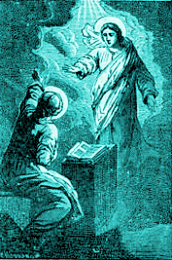Lives of the Saints
Our Models and Protectors
Spiritual Bouquet:
December 24

Saints Tarsilla
and Emiliana
Virgins
(Sixth Century)
Tarsilla and Emiliana were two paternal aunts of Saint Gregory the Great, and it is this holy Pope who narrates their touching story. They renounced the world together, together consecrated their virginity to God and remained in their house as if in a convent, far removed from the conversation of the world. Encouraging one another to virtue by discourse and example, the two sisters soon made considerable progress in spiritual life.
They had a sister named Gordiana, who had taken the same engagements, but little by little fell back into affection for the world, to the great grief of Tarsilla and Emiliana. With gentleness they reproached her, but the inconstant spirit of Gordiana soon forgot their charitable lessons. One day Tarsilla had a vision, in which Pope Saint Felix, her uncle, appeared to her and showed her a palace of marvelous beauty, saying to her: Come; I will receive you into this habitation of light. She fell ill with a fever the next day, which rapidly grew worse. While in her agony, with her eyes lifted to heaven, she cried out to those surrounding her, Make way! Jesus is coming! Soon after speaking these words, as she gazed at the vision, her soul was delivered from the bonds of the flesh. It was December 24th. The fragrance with which the room was filled confirmed the vision the virgin had had before dying.
A few days afterwards she appeared to her sister Emiliana, saying: My sister, come! I did not celebrate with you the birth of the Lord, but together we will celebrate the feast of the Epiphany. If you call only me, Emiliana replied, what will become of our sister Gordiana? Come, Tarsilla answered sadly; Gordiana has decided to remain with the worldlings. And after that vision, Emiliana fell ill and joined her sister for the feast day.
Reflection: Saint Gregory reminds us, as he tells of the three sisters, that only the one who perseveres to the end will be saved, and that it is of no use to begin, if we do not complete the work of saving our soul.
Vie des Saints pour tous les jours de l'année, by Abbé L. Jaud (Mame: Tours, 1950).